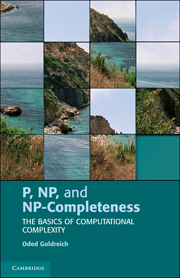Book contents
- Frontmatter
- Contents
- List of Figures
- Preface
- Overview
- To the Teacher
- Notations and Conventions
- Main Definitions and Results
- 1 Computational Tasks and Models
- 2 The P versus NP Question
- 3 Polynomial-time Reductions
- 4 NP-Completeness
- 5 Three Relatively Advanced Topics
- Historical Notes
- Epilogue: A Brief Overview of Complexity Theory
- Appendix Some Computational Problems
- Bibliography
- Index
Appendix - Some Computational Problems
Published online by Cambridge University Press: 05 June 2012
- Frontmatter
- Contents
- List of Figures
- Preface
- Overview
- To the Teacher
- Notations and Conventions
- Main Definitions and Results
- 1 Computational Tasks and Models
- 2 The P versus NP Question
- 3 Polynomial-time Reductions
- 4 NP-Completeness
- 5 Three Relatively Advanced Topics
- Historical Notes
- Epilogue: A Brief Overview of Complexity Theory
- Appendix Some Computational Problems
- Bibliography
- Index
Summary
Although we view specific (natural) computational problems as secondary to (natural) complexity classes, we do use the former for clarification and illustration of the latter. This appendix provides definitions of such computational problems, grouped according to the type of objects to which they refer (i.e., graphs and Boolean formula).
We start by addressing the central issue of the representation of the various objects that are referred to in the aforementioned computational problems. The general principle is that elements of all sets are “compactly” represented as binary strings (without much redundancy). For example, the elements of a finite set S (e.g., the set of vertices in a graph or the set of variables appearing in a Boolean formula) will be represented as binary strings of length log2 |S|.
Graphs
Graph theory has long become recognized as one of the more useful mathematical subjects for the computer science student to master. The approach which is natural in computer science is the algorithmic one; our interest is not so much in existence proofs or enumeration techniques, as it is in finding efficient algorithms for solving relevant problems, or alternatively showing evidence that no such algorithms exist. Although algorithmic graph theory was started by Euler, if not earlier, its development in the last ten years has been dramatic and revolutionary.
Shimon Even, Graph Algorithms [8]A simple graph G=(V,E) consists of a finite set of vertices V and a finite set of edges E, where each edge is an unordered pair of vertices; that is, E ⊆ {{u, v} : u, v∈V ∧ u≠v}.
Information
- Type
- Chapter
- Information
- P, NP, and NP-CompletenessThe Basics of Computational Complexity, pp. 177 - 180Publisher: Cambridge University PressPrint publication year: 2010
